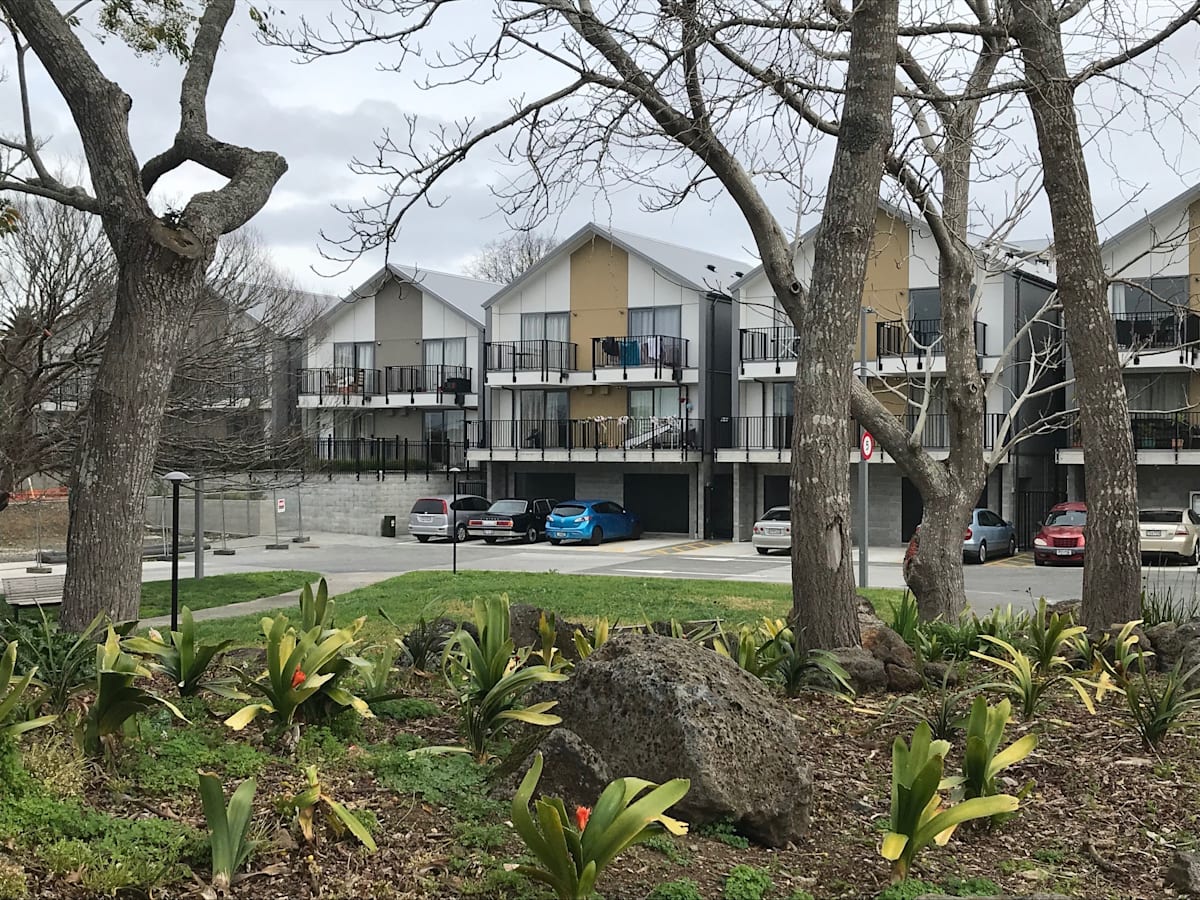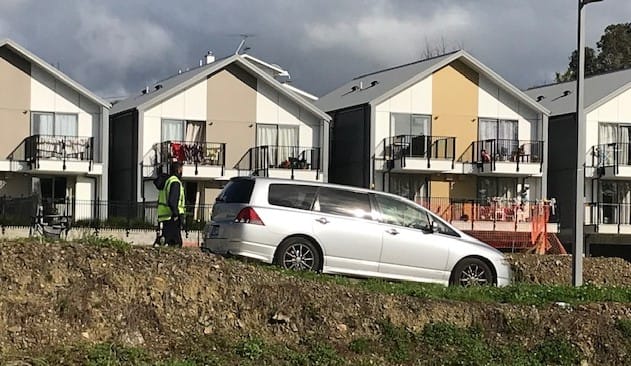It’s as stylish as state housing gets with Kainga Ora in the 21st century – a line of smart new units over the fence from private homes with $2m price tags.
But no matter how classy the environment in suburban inner-Auckland, it’s an expensive business getting everyone to follow the rules, keeping them safe and the neighbours at least partially satisfied.
In this chic state development of 20 one-bedroom homes in Mt Albert’s Asquith Ave, Kainga Ora (Housing New Zealand) has so far spent close to $300,000 on security guards during Auckland’s Covid-19 lockdowns and beyond. That’s probably the capital cost of two of those units, all chewed up in barely five months and never to be recovered.

Security shifts of two men from a private company operated 24 hours a day, seven days a week from April 2 to June 26 at a cost of $170,000 before resuming under the second lockdown.
In an official information response, the state corporation has put the latest security cost – for 48 days from August 12 until September 30 – at $88,000.
Two weeks on, the guards are still there, at a juicy daily rate of $1829 for their company, pushing the total overall bill to something like $285,000, and still climbing.
With that sort of economics, a live-in security officer would make more sense, giving greater comfort to both neighbours and tenants.
For a state corporation on stretched budgets trying to eat into the insatiable demand to help people in need, Kainga Ora has been coy about the reason for such big spending at one of its showpiece developments, completed in 2019 after years of dithering.
Initially, it suggested guards were brought in after the original lockdown interrupted plans to install gates that would “help provide an enhanced sense of security for our tenants as well as the private residents living here”. Never mind that level 4 lockdown began first thing on March 26, nine days before the security men arrived.
If the lack of gates provided the grounds for the $170,000 security bill through the first lockdown, that explanation counted for nothing when Auckland moved back into the second phase on August 12. By then, the gates had been installed… and back came security.
The gate explanation was always fanciful.
The site is wide open – with a developer well into work on the construction of 20 four-bedroom homes for private sale around the three other edges of the 8094sq m block – and, while gates block entry to the pathway leading to the unit entrances, they are hardly impregnable. Anyone with the inclination could breach them in seconds.
For the real reason, on top of a violent home invasion linked to the complex shortly after tenants moved in, an email trail in a follow-up official information request is more compelling: a dispute stretching months between neighbours and the agency over general behaviour – in particular, one tenant and her visitors.
And not just neighbours either. Other state tenants, looking for peace and quiet in pleasant new homes, were as upset as anyone by late night noise, rowdy visitors, partying, drunkenness, abusive behaviour, lockdown breaches and suspicions of criminal behaviour.
With the gate excuse quietly shoved aside, the corporation was more candid in its second attempt to explain the security presence at Asquith Ave: “Security guards have been deployed at this site to mitigate anti-social behaviour. The primary focus is to provide for the safety and security of vulnerable tenants.”
The email trail identified one “risk related” tenant among “many vulnerable” others and indicated problems had been drifting on for months.
Which begged the question asked by neighbours: why not move her, and any other irresponsible and anti-social tenants, and let the problems go with them?
It took until mid-September before Kainga Ora apparently decided enough was enough and the problem tenant was shifted – presumably to cause friction elsewhere. One suburb’s solution becomes another’s headache.

Meanwhile, the security guards are still there 24 hours a day and the invoices keep flowing, although it is not clear why that level of “protection” is warranted. After all, war has hardly broken out, and maybe it’s an extreme and belated attempt to smother oil over a squeaky wheel.
Still, it begs a further question: if a small city-fringe development merits 24/7 security oversight (such as it was: it didn’t prevent a car on site from being tampered with), what was Kainga Ora spending across the country during Covid lockdowns?
In the official information request, the corporation listed 98 sites (corporate offices, newly acquired and vacant homes and complexes, and tenanted and untenanted residential complexes) where security was deemed necessary and more than half of them were in the Auckland area.
Most of the security fell in the first lockdown and the total cost to September 30 was $1,292,916, including GST – over 20 per cent of it trying to keep order at Asquith Ave.
The official reason: “Adherence to lockdown rules was not a consideration for the deployment of security guards. The reason for deployment was to provide a measure of safety and security for vulnerable tenants during an uncertain time.”
The fact guards remain at Asquith Ave when “uncertain times” are past us – for the moment anyway – points to an ever-climbing nation-wide security bill for Kainga Ora and a growing uneasy relationship with private homeowners.
- In the 2015/16 financial year, $653,549, including GST, was spent on security by the corporation throughout the country – a cost that has steadily increased since then, reaching $4.086m for the year to June 30.



